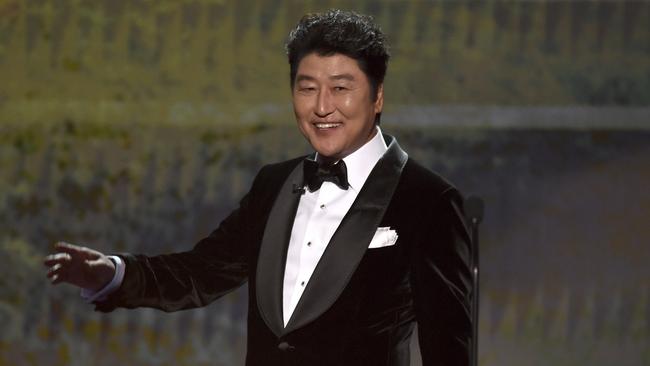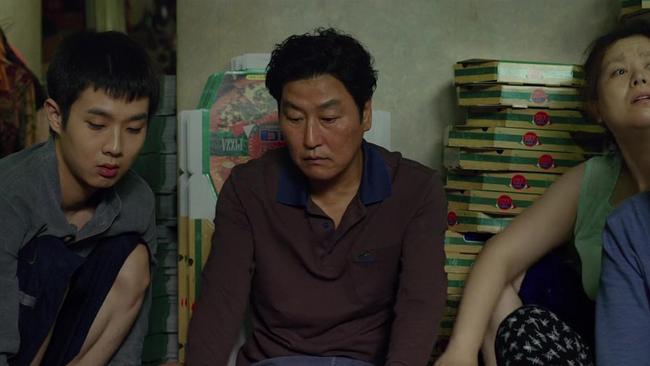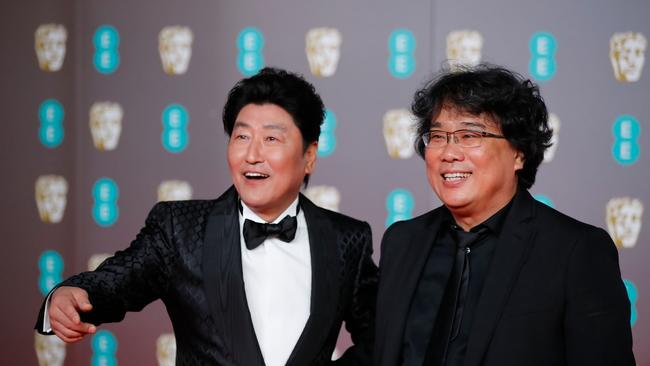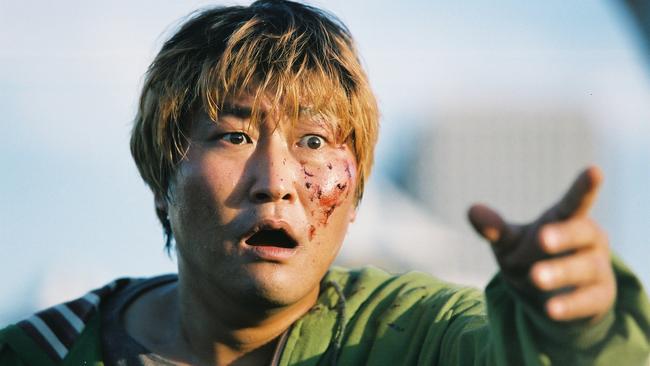Oscars 2020: Song Kang-ho, Parasite ride acclaim heading into Academy Awards
Worldwide audiences have fallen for the Seoul thriller that is tipped to take out several Oscars this weekend.

For fans of quirky sci-fi flicks, monster movies and art-house classics alike, it was the highlight of the BAFTA awards ceremony. Midway through, it was announced that in the auditorium was “one of the greatest actors of our generation”.
On cue, the camera found the subject, who shot up out of his seat and turned and waved to everyone in the Royal Albert Hall, and to those watching at home. Ecstatic cheers of delight duly rang round. And the actor? Why it was Song Kang-ho, of course!
Yes, the 53-year-old South Korean powerhouse has starred in everything from The Host (in which he played a peroxide-blond snack-bar owner battling a giant mutant amphibian) to Thirst (a priest who becomes a vampire) to the blockbuster Snowpiercer (a security expert, opposite Chris Evans on a dystopian super-train).

He is known for his expressive range, his handsome hangdog features and his ability to dignify even the most preposterous scenes with indecent gravitas.
For now, though, Song is best known for starring in the most talked-about movie of the year, Parasite. A satirical thriller set in Seoul that won best original screenplay and best film not in the English language at the BAFTAs, it is directed by Bong Joon-ho, the Martin Scorsese to Song’s Robert De Niro. The symbiotic pair began working together in 2000, in Bong’s portrait of a misanthropic professor, Barking Dogs Never Bite, and haven’t stopped since (The Host and Snowpiercer were both Bong’s).
Yet Parasite represents a seismic shift in Bong and Song’s work. The film has snagged $163m at the global box office so far and clearly has resonated with audiences and awards voters far beyond its specifically Korean milieu. It is heading into this weekend’s Oscars ceremony with a hefty six nominations — that’s the same as Little Women and Marriage Story and two more than the petrolhead blockbuster Ford v Ferrari.
Song plays Mr Kim, the head of a family of near-penniless yet resourceful con artists who inveigle their way into the luxurious existence of a Seoul millionaire called Mr Park (Lee Sun-kyun). The film was shot over 77 days in 2018 on a relatively modest production budget of $US11m, a large chunk of which was spent on constructing, from scratch, the Parks’ enormous home as well as the entire street in which the Kims live, which was fully flooded for a storm sequence late in production. It was released in May last year, premiering at the Cannes film festival, where it won the coveted Palme d’Or prize.
Even then, Song says today, speaking through an interpreter, he had no idea that Parasite would become the globe-spanning monster it is now.
“We thought that people would see the film as something quite strange and new,” he says. “We thought that Korean audiences would find it interesting, and some international audiences too. But the kind of reaction and reception that it has had has been something totally unexpected.”
He says there are elements in the film that are specifically Korean, such as the low-level Kim family apartment. “I’m not sure that foreign audiences would completely understand the symbolism of the Kim family living in the basement,” he says. “It’s a very Korean thing, where poor families, living in basements, always have this aspiration to move above ground one day.”
It leads us directly to the central riddle of the Parasite phenomenon: why worldwide audiences have fallen so heavily for this very localised tale that, according to Bong, emerged from his youthful experiences as a tutor for a wealthy family and his observations of an increasing gap between the haves and the have-nots in modern-day Seoul.
Could it be that wealth disparity is an issue that connects everyone in Western countries and gives the film its potency? “Some people relate to that aspect of the film and see it as this melancholic situation that we’re all in,” Bong says. “But others see the film in purely cinematic terms, as a drama, while others are saying that they think it’s extremely disturbing. So I think the film gets its strength from the fact that each person seems to have a different entry point into it. Yes, it reflects the issues and problems with our current social structure, but it’s a film that won’t allow you to settle on this angle only.”
He reiterates the idea that nobody close to the project expected it to become a phenomenon, and certainly not a film approaching the Oscars as a candidate for best picture, best director and best original screenplay. “We were prepared, as the season went on, to be nominated in the foreign-language Oscar category,” he says. “But all those other major categories? That was quite a surprise.”

He adds that the awards season has been long and “tough” (he has effectively been attending ceremonies and cheering for the film since last summer), but he is grateful for the reception. He has only seen “a couple” of the other best-picture contenders (he won’t name them) but plans to watch the entire list once he gets home after the Oscars.
I ask whether he’s a betting man and, if so, on which film would he place money for best picture. He bursts out laughing and says just one word: “Parasite!”
Song, who was born and reared in Busan in southeast South Korea, was a theatre actor for more than a decade before finally, in 1997, making a splash as a moody gangster in the movie comedy No 3. He has worked with South Korean heavyweight directors such as Park Chan-wook (Sympathy for Mr Vengeance, Thirst) and Kim Jee-woon (The Good, the Bad, the Weird), but his partnerships with Bong have been the most fruitful.
Song has said although he and Bong are close friends, they rarely talk on set. “It’s true, but not just with Bong Joon-ho,’’ he says. “I don’t like talking with any director. It doesn’t mean that I don’t like to take directions, which can be very helpful. It’s just that what I want to express as an actor can’t be achieved from talking to directors. I don’t like to be micromanaged.

“I want to first try, very hard, the way I imagine the character to be. And then I can chat with the director. Each actor is different. But that’s just my way.” He talks about his fame in South Korea and how it comes and goes “like a bubble”, depending on the popularity of the project. He lives in Seoul with his wife and near his two grown-up children, and will be seen next in Korean period drama The King’s Letters.
Now that Parasite has become a huge hit in Hollywood, does he think about making movies over there instead?
“Going global has never been my interest,” he says. “There were some offers after Snowpiercer. Some well-known directors offered me some roles, but I rejected them all. My philosophy as an actor is to try to make very good films within the Korean context. Going abroad to expand my workplace is not something that I’m interested in. Doing good work in Korea is something that I’m good at. And I’m very happy with that.”
THE TIMES


